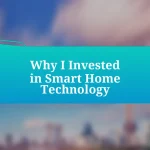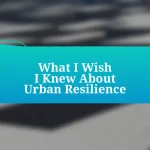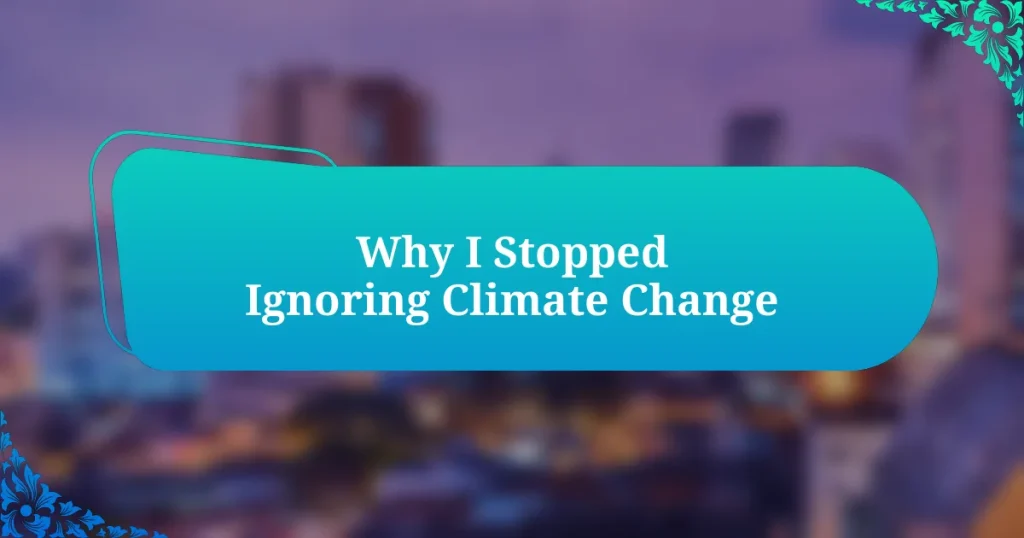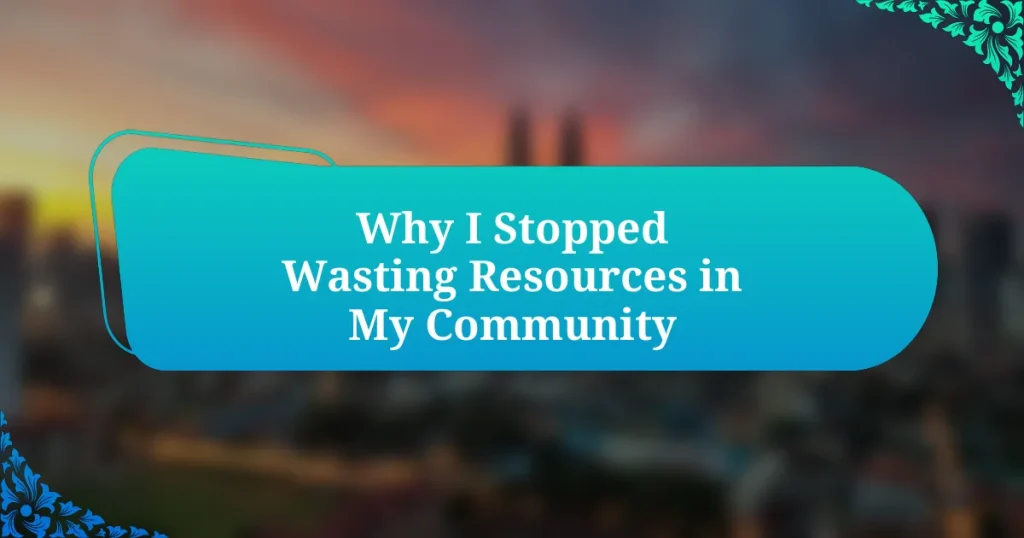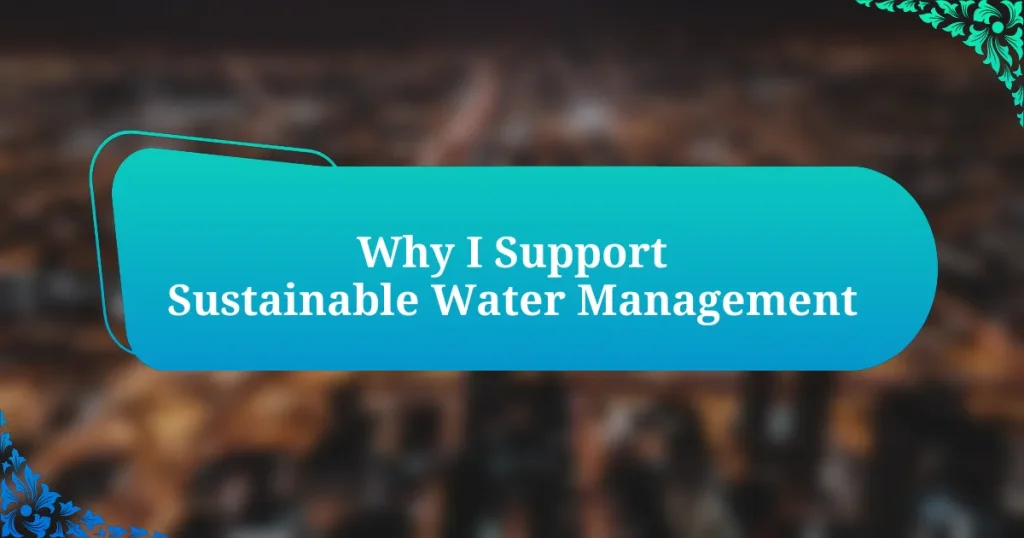Key takeaways:
- Smart City Technology enhances urban living by using data for optimized traffic flow and sustainable public services.
- Community engagement in sustainable practices, like local gardening initiatives, shows that collective actions can lead to significant environmental benefits.
- Increased climate change awareness fosters activism and encourages businesses to adopt eco-friendly practices, leading to economic opportunities.
- Personal experiences and local innovations, such as solar energy adoption and smart waste management, motivate individuals to embrace sustainable technologies.
Author: Clara Whitfield
Bio: Clara Whitfield is an acclaimed contemporary author known for her poignant storytelling and evocative prose. With a background in psychology, she intricately weaves themes of human emotion and personal growth into her narratives. Clara’s debut novel, The Echoes of Yesterday, received critical acclaim and garnered her a loyal readership. When she’s not writing, Clara enjoys exploring nature and visiting local coffee shops, where she often draws inspiration for her next story. She currently resides in Portland, Oregon, with her two rescue dogs.
Understanding Smart City Technology
Smart City Technology is all about utilizing digital innovation to improve urban living. When I first learned about how cities can use data to make better decisions, it felt revolutionary. Imagine a city where traffic flows seamlessly and public services are tailored to our needs—it’s not just a dream; it’s already happening in some places.
I’ve seen firsthand the impact of smart technologies in my community. Once, during a community gathering, a local leader explained how real-time data on air quality was helping us better understand our environment. It made me realize that when we use technology wisely, we can create healthier and more sustainable living spaces.
What truly fascinates me is how Smart City Technology addresses some of the most pressing issues we face today. For instance, can you picture a future where energy consumption is optimized through smart grids, cutting down costs and emissions? Embracing these technologies not only enhances efficiency but also fosters a sense of shared responsibility for our planet.
Importance of Sustainable Practices
Sustainable practices are crucial as they guide us towards a healthier environment while ensuring a better quality of life for future generations. I remember visiting a community garden initiative where neighbors came together to grow their own food. That experience sparked a realization for me: small, collective actions can yield significant results, promoting food security and reducing waste.
Implementing sustainable practices, such as waste reduction and energy efficiency, not only benefits the planet but also saves money and resources in the long run. During my own efforts to reduce energy consumption at home, I discovered that simple changes like switching to LED lights and using smart thermostats made a noticeable difference in my utility bills. Have you ever thought about how much we can save just by being more conscious of our daily choices?
Moreover, sustainable practices foster innovation and resilience within our communities. Recently, I attended a local seminar on green technology, where I learned about a startup focused on converting waste into energy. Witnessing such creativity in action reminded me how vital it is to support initiatives that not only address environmental issues but also stimulate economic growth and create jobs. Embracing sustainability is not just an option; it’s a necessity for thriving urban environments.
Impact of Climate Change Awareness
Awareness of climate change has sparked a powerful wave of activism and dialogue across communities. I recall volunteering for a climate march, where I felt an electric charge in the air as people united for a common cause. That experience solidified my belief that when we recognize the urgency of climate issues, we transform individual concerns into collective action that can lead to substantial policy changes.
Education around climate change has also prompted individuals and organizations to re-evaluate their practices. I found myself inspired by a local school’s initiative to incorporate sustainability into their curriculum, making students aware of their environmental footprint. This awareness can be transformational—when kids start to understand their impact, they not only change their behaviors but often inspire their families and communities to rethink their own.
Furthermore, increased climate change awareness encourages businesses to adopt eco-friendly practices, leading to innovation and sustainability in industry. For example, after attending a workshop on green business models, I saw a small café switch to compostable packaging. It made me wonder: how many more businesses could thrive by recognizing that environmentally conscious choices resonate with their customers? Essentially, awareness not only fosters responsibility but also opens the door to new economic opportunities.
Personal Motivation for Change
As I navigated my daily routine, I began noticing the small things—like the air quality on my morning commute and the scarcity of green spaces in my neighborhood. One day, I stumbled upon an article detailing the benefits of urban greenery not just for the environment, but for our mental well-being too. It struck me: I couldn’t ignore the connection between my personal health and the health of our planet any longer.
A turning point came unexpectedly during a family gathering. My young niece passionately discussed her school project on climate change, emphasizing how our actions today directly affect her future. Witnessing her enthusiasm made me realize how vital it is for older generations to change their ways, not just for our own benefit, but for the youth who will inherit the consequences of our negligence. How could I let her down by remaining passive?
Engaging in conversations with like-minded individuals has also fueled my motivation for change. I remember discussing community initiatives with a neighbor, who shared stories of local efforts to reduce plastic waste. Hearing how these grassroots movements were not only making an impact but also building stronger community ties motivated me to take action. If others can make significant strides in their neighborhoods, why couldn’t I contribute to this growing movement?
Embracing Smart Solutions
Embracing smart solutions in our communities has been a revelation for me. I remember attending a local workshop on smart city technology, where experts discussed how data-driven systems can optimize energy usage. Hearing about cities implementing smart grids to minimize electricity waste left me wondering: if we can harness technology to create more efficient living spaces, why aren’t we doing it everywhere?
There was a moment when I watched an interactive presentation showcasing smart waste management systems. The idea of using sensors to detect when bins were full, thus optimizing collection routes, really struck me. It was a simple yet powerful concept, dramatically reducing carbon footprints and improving urban cleanliness. I couldn’t help but think, are we ready to adopt these transformative technologies, or will we let complacency hold us back?
I’ve found that adopting these innovations doesn’t require a big commitment at first. For example, I recently started using a mobile app that tracks my energy consumption at home. It provides real-time feedback and suggestions on how to save energy, which has made a noticeable difference in my utility bills. If something as straightforward as an app can spark this kind of change in my daily habits, imagine the collective impact of a city-wide initiative?
Implementing Sustainable Technologies
Implementing sustainable technologies has become a personal passion of mine, especially after I started utilizing solar panels in my home. The feeling of generating my own electricity and reducing my carbon footprint was incredibly empowering. I couldn’t help but wonder—if every household embraced solar energy, how much of an impact could we have on our planet?
I recall a day when my city introduced electric vehicle (EV) charging stations in local parking lots. It was more than just convenience; it felt like the city was taking a stand against pollution, creating an environment where eco-friendly choices were celebrated. Watching community members eagerly charge their cars inspired hope—a sign that we can move towards a more sustainable future together.
When I attended a community meeting about smart irrigation systems for public parks, I was genuinely impressed by their potential. These systems use sensors to optimize water usage, ensuring that plants receive just the right amount of water. I thought about my own garden and how these technologies could help save precious water resources while keeping our green spaces thriving. Isn’t it amazing how something so tech-savvy can directly enhance our natural environment?





